2022 was an atypical year for reading for me largely because it turned out that 67% of the 103¹ books I’ve read this year were research for the novel, which, among other things, meant that my numbers got skewed in interesting ways, like the fact that only 29.5% of the books were fiction (compared to 38.9–60.8% in the years that I’ve been tracking). Even with that, I did meet my goal of half of my books by women (50.2% in fact) although I fell short of my goal of 20% non-white authors with only 19% PoC authors. There will be graphs after my list of favorite books which starts below in no particular order. Not too surprisingly, it’s a bit heavy on books I read as novel research.
- Treason by Terese Svoboda. Terese was one of my mentors in my MFA and even though she was originally a poet, this is my first extended encounter with her poetry and—it’s great stuff.
- Double Jeopardy: Gender and the Holocaust by Judith Tydor Baumel. Great collection of essays on women’s experiences in the Shoah.
- The Brothers Ashkenazi by Israel J. Singer. Isaac Bashevis had an older brother who, it turns out, was an even better writer.
- Refuse to Be Done:How to Write and Rewrite a Novel in Three Drafts by Matt Bell. One of the best craft books I’ve read, period.
- Five by Endo by Shūsaku Endō. Four outstanding short stories and a novel excerpt that doesn’t really work as a stand-alone piece.
- Saint Maybe by Anne Tyler. A compelling novel of loss, guilt and faith.
- Prep by Curtis Sittenfeld. An interesting look at relationships between prep-school girls.
- La Casa de los Espiritus by Isabel Allende. If you haven’t read Allende, you should read Allende. If you haven’t read Allende in Spanish, you should read Allende in Spanish.² If you don’t read Spanish, you should learn Spanish so you can read Allende in Spanish.
- From the Jewish Provinces: Selected Stories by Fradl Shtok. One of these great underappreciated writers of the Shoah.
- A Scrap of Time and Other Stories by Ida Fink. Ditto.
- The Nazi and the Barber by Edgar Hilsenrath. An extravagant narrative that is, in some ways, all the better for its flaws.
- Hiroshima Diary: The Journal of a Japanese Physician, August 6–September 30, 1945 by Michihiko Hachiya. A stunning account of the aftermath of the bombing of Hiroshima.
- The Hundred Thousand Kingdoms by N. K. Jemisin. A fascinating exercise in characterization and world-building. The rest of the trilogy is good but not essential.
- Out of the Whirlwind: Essays on Mourning, Suffering and the Human Condition by Joseph B. Soloveitchik. I’ve been finding that I really connect with Jewish theology, whether it’s feminist reform writing or, as in this case, modern Orthodox.
- The Romance Reader by Pearl Abraham. The best fiction brings you inside another person’s life and this does exactly that.
- The Book of Dirt by Bram Presser. An interesting experiment with form to approach the challenge of writing about the Shoah.
- Half American: The Epic Story of African Americans Fighting World War II at Home and Abroad by Matthew F. Delmont. It really bugs me that so much of what I’ve read on this subject before Delmont’s book was written by white people, who did a good enough job, but having an inside perspective makes a difference.
- We Wept Without Tears: Testimonies of the Jewish Sonderkommando from Auschwitz by Gideon Greif. One of the cruelest aspects of the Nazi genocide at Auschwitz was that they forced Jewish prisoners to lead their victims into the gas chambers and then dispose of the bodies afterwards. The testimonies here are by far the most heart-breaking of anything I’ve encountered.
And now, time for charts and graphs:
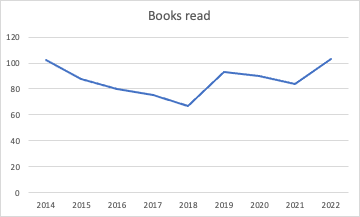
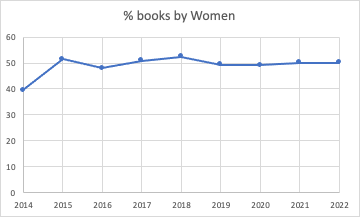
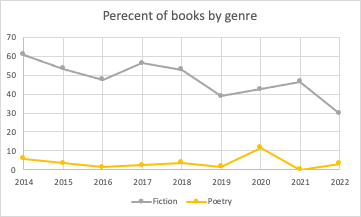
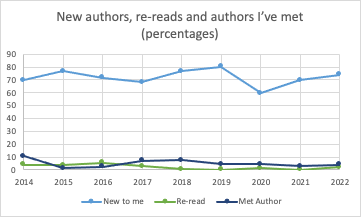
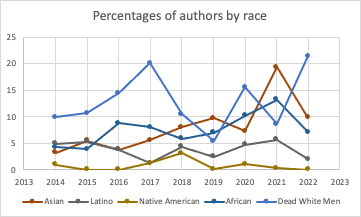
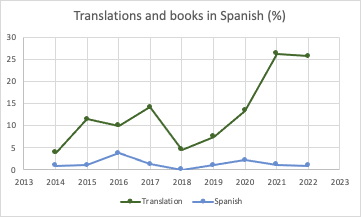
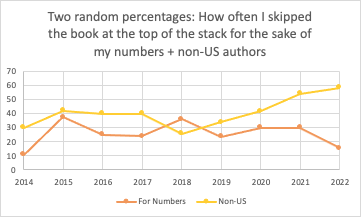
- I’m jumping the gun a little with this post as I’ve not quite finished books 102 and 103, but I will have them done by Saturday night so what the heck.
- Although truth be told, I’ve never read her in translation, but I have a hard time believing that some of her linguistic choices would translate well.
Leave a Reply